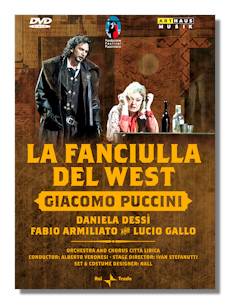
The Internet's Premier Classical Music Source
Related Links
- Puccini Reviews
- Latest Reviews
- More Reviews
-
By Composer
-
Collections
DVD & Blu-ray
Books
Concert Reviews
Articles/Interviews
Software
Audio
Search Amazon
Recommended Links
Site News
 DVD Review
DVD Review
Giacomo Puccini

La Fanciulla del West
- Daniela Dessì - Minnie
- Fabio Armiliato - Dick Johnson (Ramerrez)
- Lucio Gallo - Jack Rance
- Massimo La Guardia - Nick
- Andrea Patucelli - Ashby
- Marzio Giossi - Sonora
- Marco Voleri - Trin
- Massimiliano Valleggi - Sid
- Federico Longhi - Bello
- Orfeo Zanetti - Harry
- Nicola Pamio - Joe
- Claudio Ottino - Happy
- Veio Torcigliani - Larkens
- Franco Boscolo - Billy Jackrabbit
- Fulvia Bertoli - Wowkle
Orchestra & Chorus Citta Lirica/Alberto Veronesi
Ivan Stefanutti - Stage Director
Recorded Live - Puccini Festival, Torre del Lago, July 2005
Gran Teatro all all'aperto di Torre del Lago
Arthaus Musik DVD 101393 Dolby Digital DTS LPCM Stereo Full Screen
I thought this was easily one of the finest Puccini opera productions I've seen on DVD in years. La Fanciulla del West (The Girl of The Golden West) is not one of the composer's more popular operas: the big three – Tosca, La Bohème and Madama Butterfly – tower far above it in the public eye, as do Turandot and Manon Lescaut. The last time La Fanciulla was staged at the Met was 1993. But the work is better than its reputation – it is Puccini with depth, so to speak. The big catchy numbers aren't there, but there's so much good music, and such fine drama, that opera lovers ought to treat themselves to it.
Its story may be more familiar than its music: Jeanette MacDonald and Nelson Eddy – older readers will remember them – appeared in a popular 1938 film, The Girl of The Golden West, a musical version adapted from the same play (by David Belasco) as Puccini's libretto. MacDonald was quite a singer, and was the only Hollywood star I know of who achieved great acclaim on the operatic stage, but not in this Puccini opera, which she never sung. Anyway, the story, as presented in this opera, involves saloon owner Minnie, falling in love with Dick Johnson, who is really the bandit Ramerrez. Jack Rance, the Sheriff, is in love with Minnie and intent on catching Ramerrez. To make a long story short, Minnie twice saves Ramerrez from Rance and in the end the two walk off in each other's arms. Rance is left frustrated in his attempt to hang Ramerrez and in his failure to win Minnie over.
The whole production here is quite compelling, but the opera really takes wing in Act II: in Oh, se sapeste (track 26), Daniela Dessì sings passionately and beautifully, and the exchanges that ensue between her and Ramerrez (she still thinks he's Dick Johnson at this point in the opera) are quite touching, both vocally and dramatically. Armiliato, Dessi's real-life husband, is a most convincing Ramerrez. The two characters' love catches fire in this scene, but frustratingly for Ramerrez, who is totally enamored of Minnie, a woman still hesitant to commit for the moment.
Armiliato really storms the heights of passion in Act III's Ch'ella mi creda libero e lontano (track 41). Dessì then comes on with a brilliant E anche tu lo vorrai (track 42). But it's not just Dessì and Armiliato's show: Lucio Gallo as Rance and Massimo La Guardia as Nick are splendid, and the whole cast doesn't have a weak spot in it. Conductor Alberto Veronesi draws excellent playing and singing from the Orchestra & Chorus Citta Lirica. Veronesi really knows this opera well, knows Puccini well, and it comes through in his pacing and balancing of the various orchestral timbres. The sets are colorful and imaginative, catching the atmosphere of the Golden West, and the costuming is similarly effective. The sound is excellent and the camera work just fine. Only the English subtitles are subpar here: lines are often awkwardly translated, sometimes hilariously, as in, "Let's hang the Spaniard to death." But, ultimately, this is a minor quibble. Highly recommended.
Copyright © 2010, Robert Cummings.





















